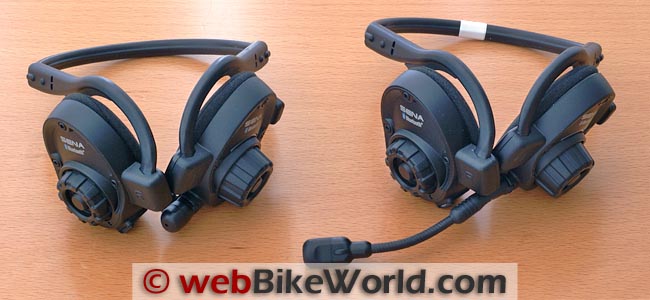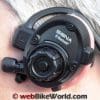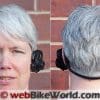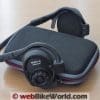Sena is an industry leader in Bluetooth communications with an ever-expanding line of motorcycle intercom systems.
So where do the Sena SPH10 Headset and SPH10H half-helmet systems fit in?
The SPH10 is an excellent system with all the expected features of a full-bore Bluetooth helmet headset.
But it is also fully portable and mobile outside of a motorcycle helmet.
This makes it perfect for a wide range of wheeled and dismounted recreational or personal activities.
Intercom performance is outstanding and battery life just slightly less so. If only the ear covers would stay in place…
Using the same benchmarks, the SPH10H half-helmet intercom system comes up short, not just because a key mounting piece failed, but also because of what I feel is poor design and execution.
This is the root cause of the final issue; it is difficult to get it neatly and securely installed in so many half-helmets.
Is there market space for a good specific half-helmet Bluetooth intercom communications system? Absolutely — and ditto for its potential to become a fully-fledged accepted member of the Sena Bluetooth family.
But it isn’t ready for prime time yet. Some constructive dialogue with evaluators and users would shed a whole lot of light on things, ultimately benefiting everyone.
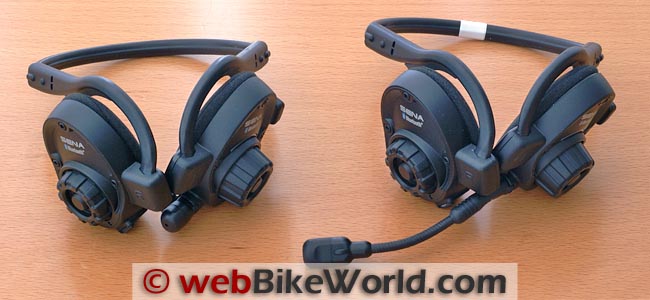
Differences Between the Sena SPH10 and SPH10H
Including the new Sena SPH10H-FM (review) and the SPH10 “Personal” headset, along with the Sena SPH10H half-helmet intercom communications system, Sena now has three intercom systems based on similar core components.
Sena SPH10 Personal Bluetooth Headset
The Sena SPH10 is a Bluetooth 3.0 “Personal” headset, “designed specifically for outdoor sports activities”, according to Sena.
It is not necessarily a motorcycle-related product, but it functions just like the other Sena Bluetooth intercoms.
It allows the wearer to make hands-free calls on a cell phone or listen to stereo music from a Bluetooth compatible device or connect with a Bluetooth compatible GPS system.
And of course, the built-in boom mic allows full-duplex conversations with other Sena Bluetooth intercom systems, which can come in handy for outdoor conversations during a wide range of activities.
Having the Sena SPH10 personal headset available was fine with me, as I had wanted a pair of these portable headsets for other recreational activities and when travelling for wandering around fair and rally sites anyway, so it was added to this review.
The SPH10 headset is fashioned like many other wired and wireless headsets on the market, albeit the housings are a bit larger and the whole system is heavier.
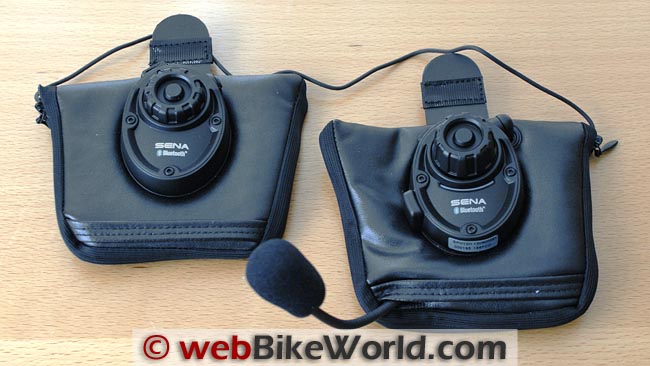
Sena SPH10H Half-Helmet Bluetooth Intercom Headset
The Sena SPH10H half-helmet Bluetooth 3.0 intercom headset has some very obvious design and visual changes from the SPH10 Personal headset described in the previous section.
The main components of the SPH10H half-helmet system are readily recognizable, only differing in how the components were adapted to form a half-helmet system.
The left and right housings mount on left and right padded, malleable ear flap pieces with a thin-wire connection between the two. These fit in the “Y” formed by the chin strap on most half-helmets.
While not a personal advocate of the half motorcycle helmet type, the market for them is huge, with a long list of choices.
Consequently, I have seen more than a few “custom” Bluetooth intercom communications system adaptations and third-party accessory solutions employed by owners, so the Sena SPH10H seems to be a simple and effective option.
While the SPH10 Personal headset and SPH10H half-helmet intercoms used for this evaluation are based on the same core system, Sena has now released a new variant of the half-helmet system, identified as the SMH10H-FM.
It uses the Sena SMH5-FM intercom (review) module mounted in the left side ear flap piece and has been given some performance enhancements as well.
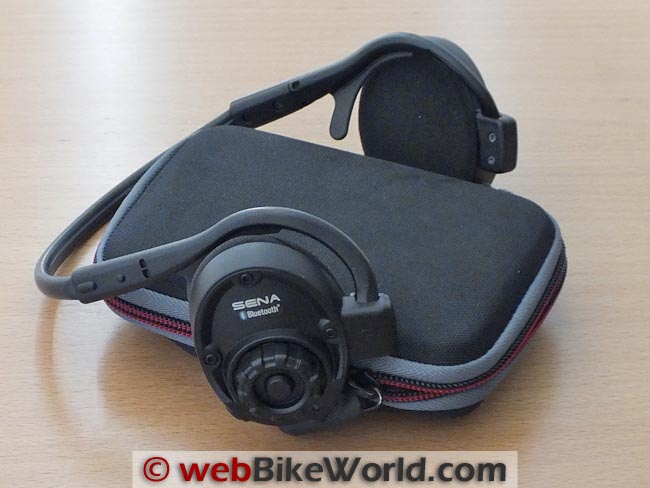
Specifications
Each SPH10 and SPH10H half-helmet retail box kit includes the Bluetooth 3.0 headset along with other components and the standard accessories for mounting, charging and updating.
Just remember that Sena doesn’t provide an AC/DC adapter but does offer a universal adapter kit for purchase.
As noted with the Sena SMH10R (review) Low Profile and Sena SMH5-FM (review) kits, the presentation, packaging and markings on the SPH10 and SPH10H half-helmet retail boxes are very good — highly standardized and most informative.
Bluetooth 3.0 is included with the SPH10 and SPH10H intercoms, along with Headset Profile, Hands-Free Profile (HFP), Advanced Audio Distribution Profile (A2DP) and Audio Video Remote Control Profile (AVRCP) support.
Both systems provide multi-party conferencing, meaning two-, three- or four-way intercom conferencing configurations are supported, along with three-way conference calls between the user, a caller and a connected intercom participant.
Standard features include Multipoint for simultaneous support of paired mobile phone and GPS devices and the Sena voice prompt menu.
Also the unique Sena Jog Dial interface and an integrated Audio Booster and the intercoms are water resistant.
Battery life is claimed up to ten hours talk time with seven days stand-by time.
There is individual volume control for each audio source with the master volume control via the Jog Dial. The SPH10 and SPH10H are also firmware-upgradeable and include a two year warranty.
As identified above (and less the different adaptation approaches for their intended uses), the two intercom systems are nearly identical.
Although their respective left and right housings are oriented differently, with a down-sized Jog Dial remaining the dominant feature on both.
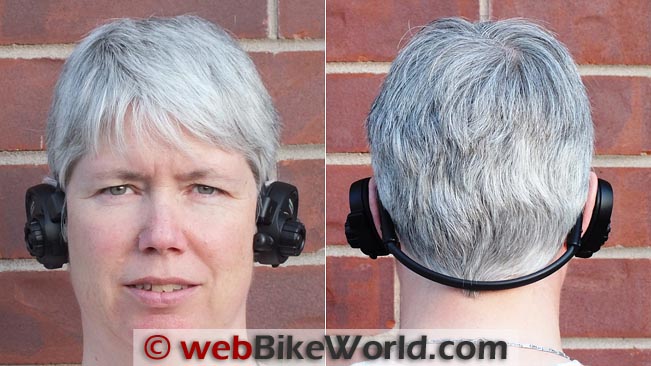
The Sena SPH10 Personal Headset
The Sena SPH10 headset fits on the user’s head and covers both ears; it does not mount inside a motorcycle helmet and nothing other than the SPH10 one-piece headset is required for the unit to function.
The left side of the Sena SPH10 Personal headset contains the main Bluetooth components.
These include the Sena Jog Dial control wheel and the small phone button located at the 5 o’clock position on the outer edge of the Jog Dial and the curved status LED sitting above the Jog Dial.
Two microphone options — a dongle or stub style and an 11 mm long boom microphone are provided with the SPH10 headset and both connect via the 2.5 mm port on the bottom front of the left housing.
The small stub microphone is hardly noticeable, as intended, while the slightly more noticeable boom microphone performs better in noisier environments — such as moving on two wheels, motorized or not.
For balance and appearance, the right side intercom module is a clone of the left, although the molded Jog Dial on the right housing is just that, a non-functioning “dummy”.
The micro-USB and 2.5 mm auxiliary input ports are located on the lower front and back of this module.
As might be expected given the components — including the battery housed in the right side — the SPH10 headset is heavier than other Bluetooth headsets, weighing in at 115 g (4.05 oz.).
By comparison my Rocket Fish RF-MAB2 Bluetooth headset is a lean 53.8 grams (1.9 oz.). But in actual use the weight of the Sena SPH10 is not obtrusive, thanks in large part to supportive ear loops and s crossbar frame and combination foam and rubber earpieces.
The ear loops are made of a hard plastic and are screwed in place (replaceable) to the thinner loop crossbar that is covered is a cushioning material for back-of-neck comfort.
This loop and back-of-neck design has become the de facto standard for personal Bluetooth intercom headsets (other than in-ear types), but I’m not convinced it should be the only option.
Regarding the feature set and functionality, the SPH10 personal headset includes everything found in the other Sena Bluetooth intercom models.
That includes a well-proven 900 meter intercom range and, of course, the SPH10 will pair with any other Sena Bluetooth intercom system.
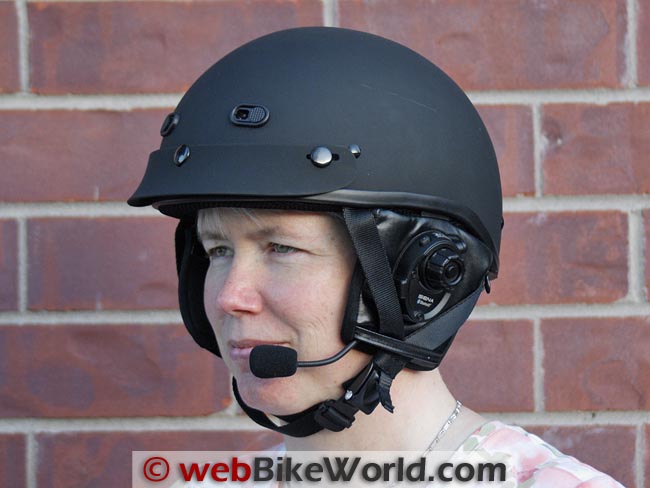
The Sena SPH10H Half-Helmet Intercom Communications System
With the same intercom module used for both the SPH10 and SPH10H, there aren’t a lot of differences, less those needed for adaptation purposes.
Those essentially come down to mounting the left and right intercom modules (with integrated speakers) into the left and right padded ear flaps that fit under the “Y” of the half-helmet chin strap.
As reversed from the personal headset model, the phone button is located at the 11 o’clock position on the outside of the Jog Dial housing, with the LED just below it while the 9 mm long boom microphone exits the lower front of the left zippered flap.
The right side flap hosts the molded intercom module housing with the micro-USB and 2.5 mm auxiliary input ports located on the top back and front of this housing. A 31 cm (12.2 inch) long thin wire lead is the only link between the two sides.
Except for a stated intercom range of (only) 500 meters — basically the same as the original Sena SMH5 intercom — the other features and functions offered in the other Sena intercoms are present in this system.
Note that the newest version of the SPH10H-FM, with a built-in FM radio, identifies an intercom range of 700 meters.
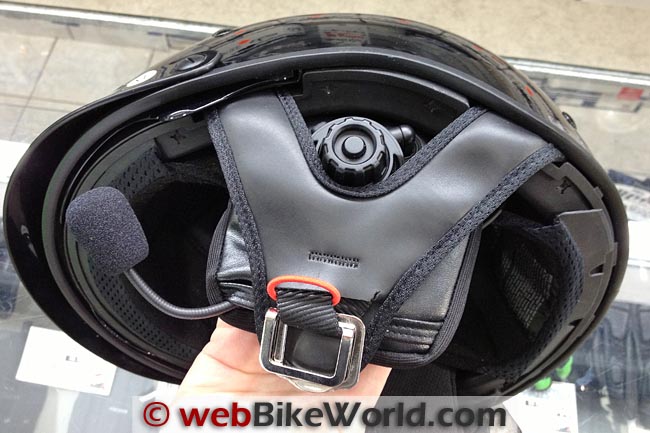
Installing the Sena SPH10 and SPH10H Intercoms
Installation instructions for the Sena SPH10 headset are simple: charge it, configure it, slip it on the head and use it.
But getting the SPH10H half-helmet headset installed neatly into the typical half-helmet can be a bit more challenging.
That’s not just due to the shape and mounting approach for the two flaps that hold both speakers, but also due to the many design variances in the various brands of half-helmets.
Sena says that the ear flap pieces are a “snap-in” fit to the motorcycle helmet…but trust me, they aren’t.
The trapezoidal-shaped flaps are wider at the top with a hard plastic tab/insert stitched into the centre top of each flap.
This bendable insert tab is stitched into the top of the flap and has a small section of the hook half of hook-and-loop stitched to it that is meant to engage and grip as the insert is pushed between the liner and shell. This is easy to say; harder to do.
Depending on the design and construction of the half-helmet used for the installation and whether it has any side flap material or inserts — especially those meant for cold weather use that already have ear flaps — the flaps on the Sena SPH10H may not be mountable in the intended manner.
That’s especially the case if the outer shell and impact liner of the helmet are fully glued or sealed together along the bottom.
On one helmet, the workable solution was to put the insert between the impact and brushed head liner.
A Zox half-helmet was actually the first candidate; with the inserts carefully worked up between the inner impact liner and shell the flaps were positioned correctly for ear and speaker placement, but the top edges didn’t line up well with the edge of the helmet.
This was an issue we found with every helmet we tried.
What does allow the side pieces to work (more or less) are the thin straps stitched onto the outside bottom of each flap, which the chin straps on the helmet would be routed through on their way to being connected.
Again, how well this works is very much dependent on the size and shape of the side straps; some work well, others not at all. And remember, your experience may differ from mine.
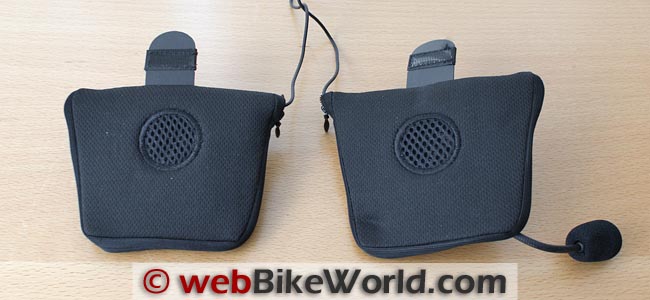
System Configuration & Management
There isn’t much need to detail how to configure or use the versatile Bluetooth features of either the Sena SPH10 or SPH10H intercoms because the configuration and functionality is identical for both headsets.
And they are also similar to any of the other Sena intercoms reviewed on webBikeWorld.
Intercom pairing on the SPH10 and SPH10H is done the traditional way using the unique Sena Jog Dial and the phone button.
Selective pairing with other Bluetooth devices is detailed in the usual excellent Sena User Guide, packed in each kits (updated versions are available for download in PDF format).
Firmware updates can be very effective, if exploited by users, and they are available on the Sena intercom support page once the intercoms are registered by the owner.
The Sena Bluetooth Device Manager (now at version 1.4) is the one-stop application for managing any of the upgradeable (USB-based) Sena systems.
As with any of the other Sena Bluetooth headsets, checking the battery level can be done in two ways, visual and audible.
For an audio battery status update, power up the headset and hold the Jog Dial and phone button for three to four seconds until three high tones are heard.
This will be followed by the spoken status announcement voice, which speaks the battery level as high, medium or low.
The battery status information is also provided automatically and visually when the intercom is turned on — just watch the red LCD.
Four flashes indicate a 70 to 100% charge; three flashes indicate a 30 to 70% charge and two flashes mean a low charge of up to 30%.
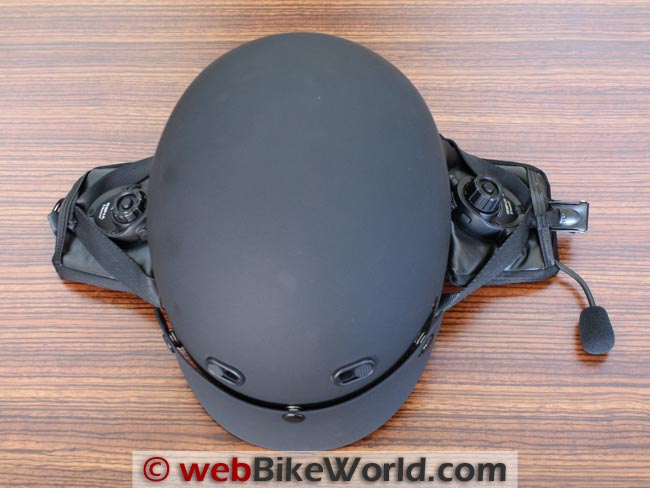
Function and Performance Observations
As expected, there aren’t a lot of differences in function and performance between the SPH10 Personal headset or the SPH10H half-helmet headset other than the reduced range of the SPH10H half-helmet system.
They have, after all, the same basic components. Nevertheless, some individual usage observations can be made.
The Sena SPH10 Personal Headset
Over-the-ear headsets can be comfortable, unless you wear eyeglasses (as both the Editor and I do).
And combined with less than ideally shaped cross-supports, the whole experience in wearing a headset like the SPH10 can be either comfortable or aggravating.
Aggravating comes to mind when a headset of this type is combined with driving a four-wheeler were the neck and head are typically up against a headrest of some sort.
Thinner, more flexible and adjustable ear loops and an adjustable (back or neck or over the head) cross-piece component would be great options.
Another issue we encountered is that the foam or rubber ear pieces have a tendency to pop out of their housings.
Once they’re realigned the two pieces will snap together again, but it can be a bit disconcerting when it happens and it does, frequently.
Besides these two design-related issues and the less-than-stellar audio quality from the (basic) lightweight speakers in the SPH10, performance of the “Personal” headset is excellent.
Yes, it can be worn with some half-helmets or similar variants, as long as the chin straps can be accommodated. But don’t forget that at higher speeds, even on a non-motorized wheeled vehicle, ambient noise levels can greatly affect the performance.
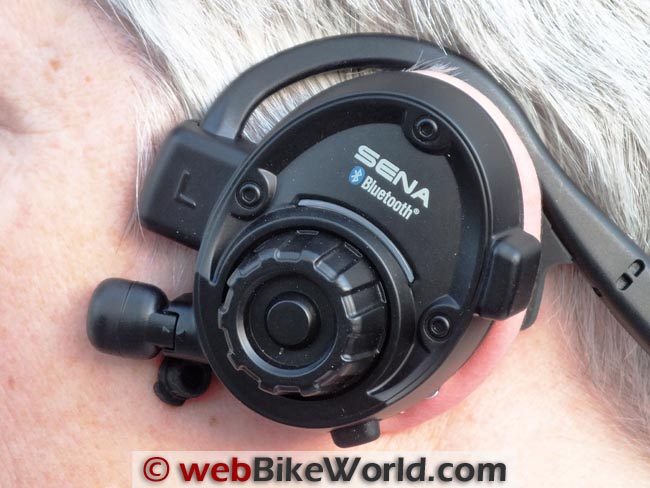
The Sena SPH10H Half Helmet Headset
The single thin-wire connection between the two ear flaps on the Sena SPH10H concerned me and rightly so as it turned out — the system quit working two days into the evaluation.
Removing the speaker modules from each ear covering allowed me to troubleshoot and solve the issue, seemingly a strained lead, which I reinforced.
Since this worthwhile discovery effort and reinforcement of other lead points, the system made a full recovery, for half a day until another issue arose.
The right side tab or insert piece decided to fatigue and break at the stitched point due to weakness induced by the punched holes for the stitching. As this insert is the primary means of mounting the flap to the helmet, it is missed.
A local repair effort (beyond duct tape) is likely to work, but regardless this is an obvious weak component that needs to be revisited by Sena.
So after only a couple of days and limited riding with the Sena SPH10H installed in the Zox half-helmet, I can state that it does work, although noise levels overcome the audio at less than and above highway speeds.
This was evident even on the BMW R 1200 GS and F 800 GS motorcycles, both with good windscreens.
So my feeling is that motorcycles with less coverage than that (e.g., Harley-Davidson cruisers) may find even more noise is transmitted through the SPH10H intercoms. Since the SPH10H is obviously targeted at cruiser owners, this is a problem.
However, the coverage provided by many touring and full-up cruisers might provide a quieter environment, depending on the type of exhaust installed.
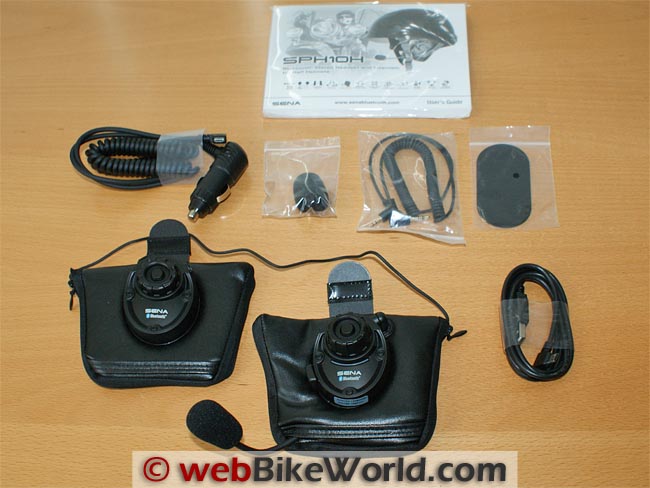
Conclusion
Both the Sena SPH10 and Sena SPH10H half-helmet intercom headsets work as advertised.
And both have the infinitely valuable Sena Jog Dial, along with all the great and unique capabilities provided by the aggressive firmware development and support activities at Sena (nobody else comes even close).
But these two siblings just don’t exude the same positive vibes I get from the other members of the Sena intercom family, including the relatively basic Sena SMH5 intercoms.
While the SPH10 personal headsets get daily and very much appreciated use, I have, for now, relegated the SPH10H half-helmet intercoms to the shelf.
But there is light on the horizon; the new Sena SPH10H-FM half helmet intercom, based on the Sena SMH5-FM (review) module, has been released.
Given the posted specifications, performance should be better, although whether they will be more durable and installation-friendly remains to be seen. I remain optimistic.
More webBikeWorld Sena Intercom Reviews
Owner Comments and Feedback
See details on submitting comments.


